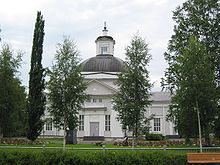
The Evangelical Lutheran Church of Finland is a national church of Finland. It is part of the Lutheran branch of Christianity. The church has a legal position as a national church in the country, along with the Orthodox Church of Finland.
The International Lutheran Council (ILC) is a worldwide association of confessional Lutheran denominations. Member bodies of the ILC hold "an unconditional commitment to the Holy Scriptures as the inspired and infallible Word of God and to the Lutheran Confessions contained in the Book of Concord as the true and faithful exposition of the Word of God." The member church bodies are not required to be in church-fellowship with one another, though many of them are.

Lapua is a town and municipality of Finland.
Confessional Lutheranism is a name used by Lutherans to designate those who believe in the doctrines taught in the Book of Concord of 1580 in their entirety. Confessional Lutherans maintain that faithfulness to the Book of Concord, which is a summary of the teachings found in Scripture, requires attention to how that faith is actually being preached, taught, and put into practice. Confessional Lutherans believe that this is a vital part of their identity as Lutherans.
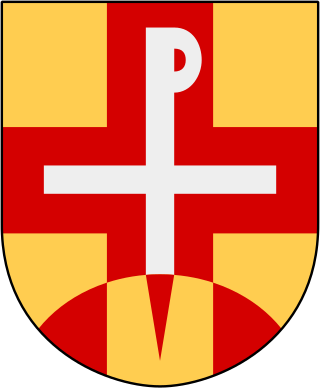
The Mission Province is a Swedish independent ecclesiastical province founded by members of the Church of Sweden who are opposed to the ordination of women to the priesthood and episcopate. The province, which aligns with Confessional Lutheranism, considers itself as a free-standing diocese within the Church of Sweden, a position rejected by the church itself. The Mission Province was founded on 6 September 2003 and shares altar and pulpit fellowship with those in the Communion of Nordic Lutheran Dioceses, in addition to being a member of the International Lutheran Conference.
The Archdiocese of Turku, historically known as Archdiocese of Åbo, is the seat of the Archbishop of Turku. It is a part of the Evangelical Lutheran Church of Finland, and its see city is Turku.

The Diocese of Borgå is a diocese for the Swedish-speaking minority of Finland. It is a part of the Evangelical Lutheran Church of Finland. Porvoo is also the old seat of the present-day (Finnish-speaking) Diocese of Tampere.

Finland is a predominantly Christian nation where 65.2% of the Finnish population of 5.6 million are members of the Evangelical Lutheran Church of Finland (Protestant), 32.0% are unaffiliated, 1.1% are Orthodox Christians, 0.9% are other Christians and 0.8% follow other religions like Islam, Hinduism, Buddhism, Judaism, folk religion etc. These statistics do not include, for example, asylum seekers who have not been granted a permanent residence permit.
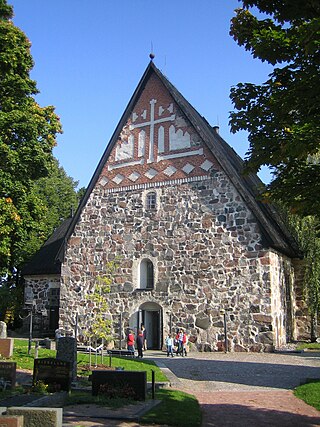
Espoo Cathedral is a medieval parish church and cathedral in Espoo, Finland. It is the seat of the Evangelical Lutheran Diocese of Espoo, established in 2004. The cathedral is located in the district of Espoon keskus, near the Espoonjoki river. The oldest parts of the church were completed in the 1480s and it is thus the oldest preserved building in the city.

Päivi Maria Räsänen, née Kuvaja, is a Finnish politician. The chairwoman of the Christian Democrats from 2004 to 2015, she was the Minister of the Interior of Finland between 2011 and 2015.

The Evangelical Lutheran Church in Namibia (ELCIN) is a Lutheran denomination based in Namibia. It has a total membership of over 853,522 in 2023, mainly in Northern Namibia. Formerly known as the Evangelical Lutheran Ovambo-Kavango Church (ELOC), it played a significant role in opposition to Apartheid in Namibia and was part of the Namibian independence struggle.
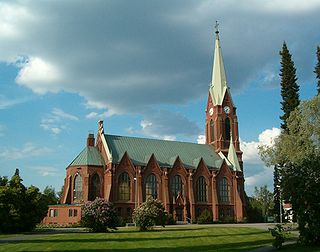
The Diocese of Mikkeli is one of nine dioceses in the Evangelical Lutheran Church of Finland. It was founded in 1897 in the town of Savonlinna. Later, in 1924 the episcopal see was moved to Viipuri, but after Finland lost the city to the Soviet Union, the see was moved to Mikkeli in 1945. It has since been located there.
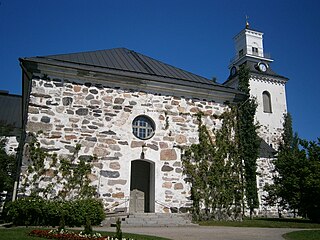
The Diocese of Kuopio is a diocese within the Evangelical Lutheran Church of Finland. It was founded in 1939.
Military Bishop is a military rank and position within the Finnish Defence Forces. The Military Bishop is the leader of both Lutheran and Orthodox priests and deacons serving in the army as military chaplains. The office was founded by President Risto Ryti in 1941. The position of military bishop is comparable to that of a brigadier general.

Vilho Annala was a Finnish civil servant, economist and far right politician.
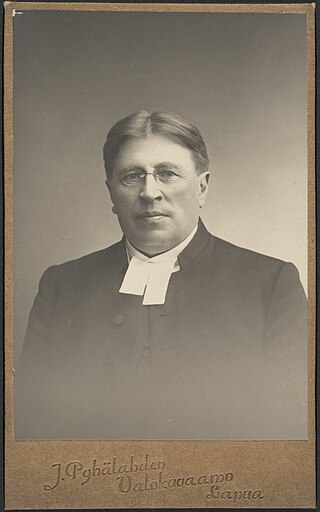
Wilhelm "Wilhelmi" Malmivaara was one of the leaders of Finnish Awakening in the beginning of the 20th century. He was a member of the synod of the Evangelical Lutheran Church of Finland in 1898, 1908, 1913 and 1918 and was also a representative of the clergy in the pre-independence Diet of Finland in 1897, 1899, 1900 and 1904–05 and a member of the Parliament of Finland, representing the Finnish Party from 1907 to 1918 and the National Coalition Party from 1918 to 1920.
The Mission Diocese, officially the Evangelical Lutheran Mission Diocese of Finland, is an independent confessional Lutheran "ecclesial structure" in Finland. The Mission Diocese considers itself to be "part of ‘the one, holy, catholic and apostolic church’" to be "truly a church" and to act "fully independently as a church", although it has not applied for state-recognition as a registered religious community. The Mission Diocese has its origins in the conservative movements of the Evangelical Lutheran Church of Finland (ELCF) and it self-identifies as existing in the same continuum of Lutheran faith and congregational life of the ELCF whose spiritual heritage it cherishes, yet not being part of its administrative structures.
The Communion of Nordic Lutheran Dioceses are Lutheran dioceses that entered into schism with their nordic national churches in 2003 due to what they perceived as "the secularization of the national/state churches in their respective countries involving matters of both Christian doctrine and ethics". These dioceses are members of the International Lutheran Council, a body of Confessional Lutherans, they are in full communion with one another and include the Evangelical Lutheran Mission Diocese of Finland, Mission Province of the Church of Sweden, and the Evangelical Lutheran Diocese of Norway. These dioceses entered into schism with the Evangelical Lutheran Church of Finland, Church of Sweden, and Church of Norway, respectively, though the Mission Province considers itself to be a non-territorial diocese within the Church of Sweden. Their lines of apostolic succession derive from other traditional Lutheran Churches, such as the Evangelical Lutheran Church in Kenya; Walter Obare Omwanza, presiding bishop of the Evangelical Lutheran Church in Kenya, assisted by bishops Leonid Zviki from Belarus, David Tswaedi from South Africa, Børre Knudsen and Ulf Asp from Norway, consecrated Arne Olsson in apostolic succession as the Ordinary for the Mission Province. The first bishop of the Evangelical Lutheran Mission Diocese of Finland, Risto Soramies, was then ordained by Matti Väisänen of the Mission Province of the Church of Sweden. These dioceses have an Evangelical Catholic churchmanship, reflective of the influence of High Church Lutheranism and Pietist Lutheranism in Scandinavia. As such, the Communion of Nordic Lutheran Dioceses affirms:
We believe, teach and confess that biblical faith and doctrine which is founded on the prophetic and apostolic Scriptures of the New and the Old Testament and which has been expressed in the three main creeds of the Early Church, that is, the Apostolic, the Nicene-Constantinopolitan and the Athanasian Creed, and in the unaltered Augsburg Confession, and that is rightly and bindingly explained by all the books accepted into the Book of Concord of the Lutheran Church.
